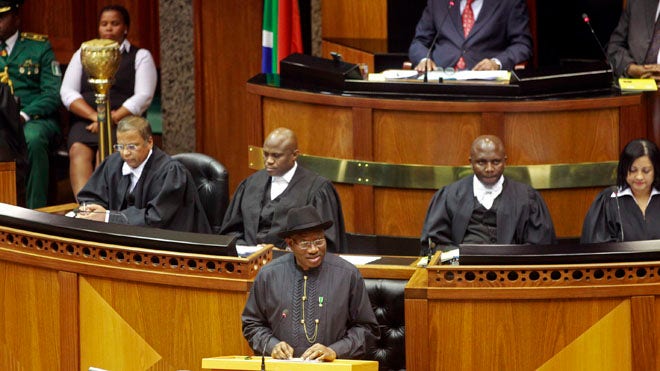Nigerian president declares state of emergency
-
May 7, 2013: Nigerian President Goodluck Jonathan, center,
makes a speech in the South African Parliament in Cape Town. On May 14,
2013, President Goodluck Jonathan declared a state of emergency in
Nigeria. (AP)
Nigeria's president declared a state of emergency Tuesday across
the country's troubled northeast, promising to send more troops to fight
an increasingly violent Islamic insurgency.
Islamist sect Boko Haram -- whose name means "Western education is
sacrilege" in the Hausa language of Nigeria's north -- has intensified
its attacks on security forces and government targets in its northeast
stronghold this month, prompting President Goodluck Jonathan to declare a
state of emergency in certain states.
Last week, dozens of Boko Haram fighters in buses and machine
gun-mounted trucks laid siege to the town of Bama, in Borno, killing 55,
mostly police and other security forces, and freeing more than 100
prison inmates. Days earlier, scores were killed in the fishing village
of Baga, also in Borno, on the shores of Lake Chad, when troops from
Nigeria, Niger and Chad raided it looking for Islamists. Local residents
said soldiers were responsible for many civilian deaths.
President Jonathan, speaking live on state radio and television
networks, also warned that any building suspected to house Islamic
extremists would be taken over in what he described as the "war" now
facing Africa's most populous nation. However, it's unclear what the
emergency powers will do to halt the violence, as a similar past effort
failed to stop the bloodshed.
"It would appear that there is a systematic effort by insurgents and
terrorists to destabilize the Nigerian state and test our collective
resolve," Jonathan said.
Jonathan said the order will be in force in Adamawa, Borno and Yobe
states. He said the states would receive more troops, though he will not
remove state politicians from their posts. Under Nigerian law, the
president has the power to remove politicians from their posts and
install a caretaker government in emergency circumstances.
The president's speech offered a stark vision of the ongoing
violence, often downplayed by security forces and government officials
for political reasons. Jonathan described the attacks as a "rebellion,"
at one point describing how fighters had destroyed government buildings
and "had taken women and children as hostages."
"Already, some northern parts of Borno state have been taken over by
groups whose allegiance are to different flags than Nigeria's," Jonathan
said.
The president later added: "These actions amount to a declaration of
war and a deliberate attempt to undermine the authority of the Nigerian
state and threaten (its) territorial integrity. As a responsible
government, we will not tolerate this."
This is not the first time Jonathan has implemented emergency
measures. In December 2011, Jonathan declared a state of emergency over
some limited local government areas in the states, after a church
bombing blamed on Boko Haram killed 37 people, but he lifted it in July
last year. This new decree, however, is more drastic and covers whole
states, likely to cause conflict with powerful governors sitting in
those states, as well as the political opposition. On Monday, the
Nigeria Governors' Forum, representing the governors of Nigeria's 36
states, issued a statement warning Jonathan against imposing emergency
rule in response to the insurgency.
According to an Associated Press count, more than 1,600 people have
been killed in attacks by Islamic insurgents since 2010. Recently,
Nigeria's military has said Islamic fighters now use anti-aircraft guns
mounted on trucks to fight the nation's soldiers, likely outgunning the
country's already overstretched security forces.
Boko Haram has said it wants its imprisoned members freed and strict
Islamic law adopted across the multiethnic nation of more than 160
million people. It has produced several splinter groups, and analysts
say its members have contact with two other Al Qaeda-linked groups in
Africa.
The Islamic insurgency in Nigeria grew out of a 2009 riot led by Boko
Haram members in Maiduguri that ended in a military and police
crackdown that killed some 700 people.
The group's leader died in police custody, in an apparent killing.
From 2010 on, Islamic extremists have engaged in hit-and-run shootings
and suicide bombings. Recently, however, they've begun to use
military-grade weapons, some of which they apparently seized from
Nigerian military stockpiles.
Nigeria's military and police also have been repeatedly accused by
human rights activists and others of torturing and summarily killing
suspects, as well as burning down civilian homes and killing civilians
in retaliation for militant attacks.
The latest incident, in a fishing village in Borno state along the
shores of Lake Chad, saw at least 187 people killed and there are
allegations that soldiers are responsible. While the military has denied
repeatedly that it attacks and kills civilians, the country's armed
forces have a history of committing such assaults.
Separately on Tuesday, an official in the central Nigerian state of
Kaduna said gunmen armed with assault rifles and suspected to be
Hausa-Fulani cattle herders killed 11 people in a village there. And in
Benue state, a government spokesman said an attack blamed on
Hausa-Fulani cattle herders there killed at least 12 people.
Labels: Abject Corruption, Abject ignorance, Abject poverty, Banana Republic





0 Comments:
Post a Comment
<< Home